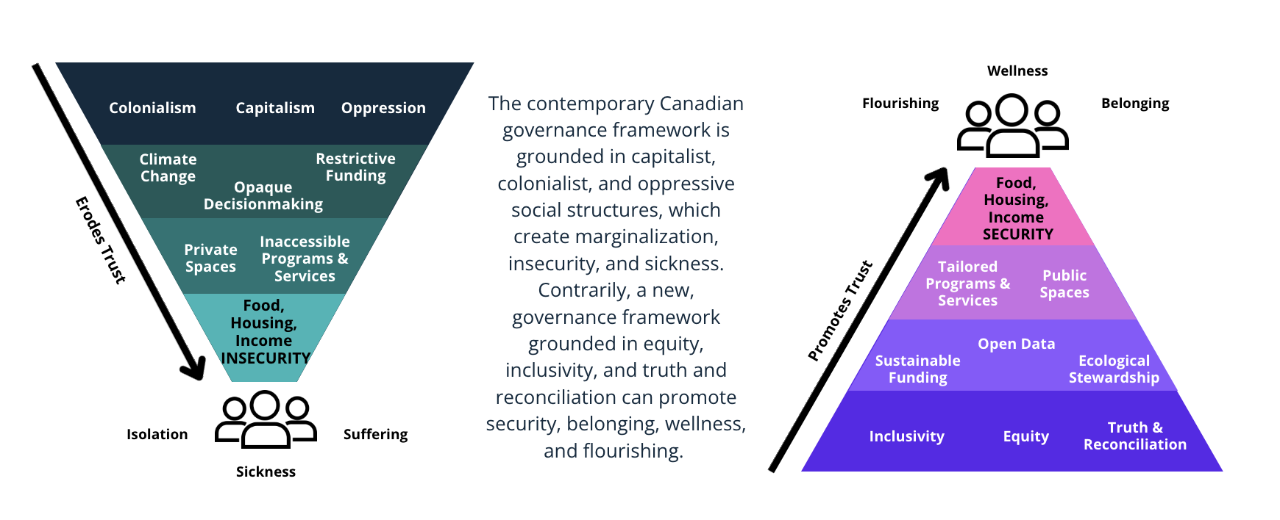Public Health Governance Project

The aim of the Public Health Governance project is to better understand experiences and systemic fault lines of health system management and care in order to collaboratively develop a public health governance framework for Canada. This project engages with members of communities commonly sidelined in governance design, including allied healthcare workers and marginalized equity deserving groups, including newcomers, and racialized individuals. The outcome, a national Public Health framework responsive to all communities is being developed through multi-sited engagements across Canada, and a deliberative engagements and will address federal, provincial, territorial and municipal levels of government policy, programs and practices.
ÔÇťPublic health is a powerful tool to level the playing field, to bend the arc of [a] country away from distrust and disparities and back towards equity and justice.ÔÇŁ ÔÇöLeana S Wen, MD
╠ř
Project Overview
Funded by the Canadian Institutes of Health Research, the Public Health Governance for a Post-COVID Canada (PHG) project is being undertaken by the Technoscience and Regulation Research Unit (TRRU) at pilipili┬■╗ş in collaboration with public health, social science, information science, and legal experts from across Canada.╠řOur╠řinterdisciplinary team is pursuing a multi-stream research agenda that aims to produce a framework to improve public health practices, policies and programs:
- Analyse existing and new data collected among equity deserving communities and public health care providers and experts to gain insights from their knowledge and experiences during the pandemic.
- Conduct a series of focus groups and deliberative engagements about public health across Canada.
- Design a public health governance framework to be developed into a CanadaÔÇÖs first Population and Public Health Act: An Act to Care.
How are we defining public health?
Public health is concerned with the determinants of health and wellbeing as a whole. An effective framework must reflect how the multiple fields implicated by public health are governed and coordinated to better achieve equitable, healthy, and productive communities and improved opportunities and conditions for all. Canada's current public health system is
Project Timeline
Phase 1 involves a literature review and jurisdictional scan focusing on public health governance, policies and practices and approaches to deliberative democracy along with innovative secondary analyses of empirical data collected in COVID-19-focused qualitative projects conducted by co-investigators across Canada.
Phase 2 involves holding pan-Canadian focus groups to gather insights from representatives of diverse communities and perspectives, with a focus on their lived experiences, capacities and capabilities. Each focus group with bring together 7-12 participants for a mediated conversation exploring their experiences during the pandemic, formal supports, strategies for resilience, experiences with healthcare infrastructures and users, as well as understandings and uses of current public health practices, processes, and programs.
Phase 3 involves two deliberative engagements. By bringing together people (20-30 people per engagement) of diverse backgrounds and positions to deliberate on the topic of health and well being (OÔÇÖDoherty et al. 2021), adaptation of this method will facilitate the development of the public health framework and policy recommendations.
Deliberative Engagement #1 was a╠řthree-day╠řstructured deliberation among╠řinternational experts in bioethics, epidemiology, public health, social sciences, and law at the Brocher Foundation (Geneva) in October 2024.╠řThe Working Group have expertise and experience in various aspects of governance, delivery, and/or assessment of public health, the operation of the social determinants of health and the planetary/One Health concept, and the pursuit of health equity in the population setting.╠řWith╠řexpertise in public health structures in their own countries, we╠řwill test and challenge the governance challenges identified during Phase 1 and╠řPhase 2 of the PHG project. The Working Group╠řwill consider╠řwhat values are reflected in and realized through the public health ÔÇśapparatusÔÇÖ in countries beyond Canada. To what extent do those values achieve the ÔÇśpublic goodÔÇÖ? How might we fairly reflect or achieve internationally-identified goals around sustainable population wellbeing and/or the ÔÇśone healthÔÇÖ model?╠ř
Deliberative Engagement #2 is a structured participant deliberation to be conducted with Canadian experts in bioethics, public health, social sciences, and law, as well as grassroots experts and diverse community representatives. It will explore questions related to their experiences with public health services, delivery, instruments and infrastructure. Ideas about improving governance will be elicited and engaged through the examination of complex public health scenarios.
We aim to explore the following questions:
What are the issues and how do we build better institutions, policies, and practices to encourage robust and resilient communities?╠ř
- What constitutesÔÇöor should constituteÔÇöpublic goods that inform our national character, and what components of public health are essential to that?
- What is needed to fix and recommit to the promise of Canada and the Canadian public health system?
View for an overview of preliminary results from our research activities to date!
